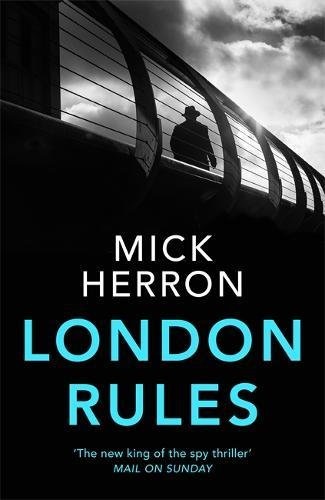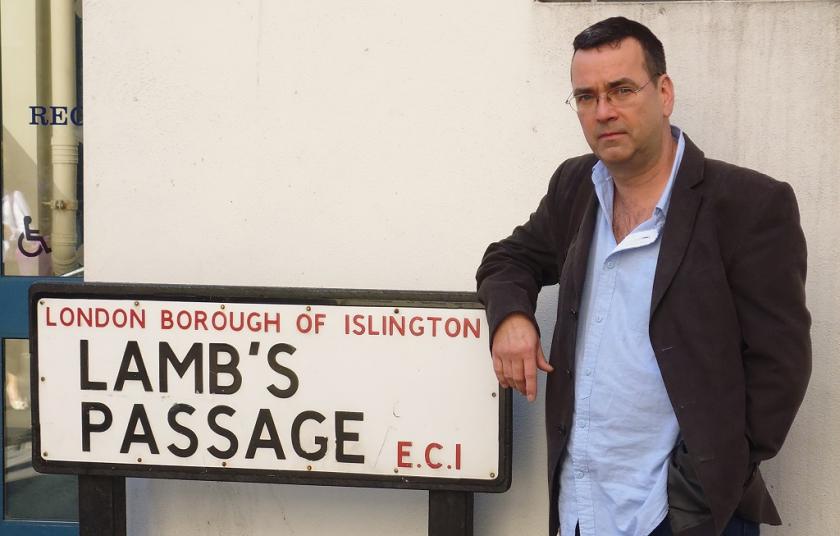London Rules – explicitly cover your arse – is the fifth in the most remarkable and mesmerising series of novels, set mostly and explicitly in London, to have appeared in years. It is hypnotically fascinating, absolutely contemporary, cynical and hopeful.
The style is utterly Herron’s own: a series of elegant vignettes, a few short paragraphs, covering just a few days of mad and often deluded action. He fields a large cast of characters, from Jackson Lamb, the omniscient, obese, flatulent, greedy mess of an experienced, now disgraced MI5 spy, and his crew of much younger men and women who have also messed up their careers, to the infighting national politicians, journalists, and top men and women at the head of the fictional headquarters of British spydom, an elegant house in Regent’s Park. Herron has created an entire imaginative world: he has publicly said he does not do research, and as far as his readers know, no personal experience of the field has infiltrated his fictions, as it has with other masters such as le Carré and Graham Greene, to whom he has been compared.
 Slow Horses, the title of the first novel, is the nickname given to the career failures, because these exiles inhabit a hideous rickety office building called Slough House, perched above a Chinese takeaway in Aldersgate, next to the Barbican. We stay with the slow horses throughout the series, and while each novel can be read as a stand-alone reading them in order is enriching. Each is there for different reasons: Catherine Standish, the nearest to a PA for Lamb, is an alcoholic who has not drunk anything for years, and who came upon her first boss, a spy at the top of the heap, as an apparent suicide. River Cartwright was sabotaged, screwing up a training exercise which managed to shut down Kings Cross for hours, and has survived himself because he comes from a top MI5 family, his grandfather in particular. JK Coe is a victim of PTSD, a psychologist, analyst and perhaps a murderer; Shirley Dander had, and has a drug problem, and lost her work partner, Marcus, a gambling addict, in a previous book. Louisa Guy, too, has lost her work partner, Min (who had left a secret file on a train), who was also her lover. They are among the handful shipped out to Slough House, forbidden to go out on operations, with the hope from the higher-ups that they will just resign, saving the expenses associated with normal dismissals.
Slow Horses, the title of the first novel, is the nickname given to the career failures, because these exiles inhabit a hideous rickety office building called Slough House, perched above a Chinese takeaway in Aldersgate, next to the Barbican. We stay with the slow horses throughout the series, and while each novel can be read as a stand-alone reading them in order is enriching. Each is there for different reasons: Catherine Standish, the nearest to a PA for Lamb, is an alcoholic who has not drunk anything for years, and who came upon her first boss, a spy at the top of the heap, as an apparent suicide. River Cartwright was sabotaged, screwing up a training exercise which managed to shut down Kings Cross for hours, and has survived himself because he comes from a top MI5 family, his grandfather in particular. JK Coe is a victim of PTSD, a psychologist, analyst and perhaps a murderer; Shirley Dander had, and has a drug problem, and lost her work partner, Marcus, a gambling addict, in a previous book. Louisa Guy, too, has lost her work partner, Min (who had left a secret file on a train), who was also her lover. They are among the handful shipped out to Slough House, forbidden to go out on operations, with the hope from the higher-ups that they will just resign, saving the expenses associated with normal dismissals.
The narratives have four interlinked strands, which make for the compelling links that reinforce the stories. There is no absolute wrong or right, although the reader roots for the slow horses; all the characters are flawed, but these are the ones we empathise with. Interactions and office politics and jockeying for power, particularly back in Regent’s Park, and not too far from Downing Street, are brilliantly described.
Above all, most of the situations and the horrors they cause are to a certain extent self-inflicted: the hinge in London Rules is a demonic strategy devised by the British to destabilise, if necessary, the countries of the Empire in order to control them, that is now turned into a road map for evil purposes by an unexpected international player in international terrorism.
The final bonus is a heartfelt fury at Britain now: the satirical portrait of a populist politician, Dennis Gimball, the leading Brexiteer (and secret cross-dresser) and his journalist wife Dodie is hilariously ferocious, with a totally unexpected weapon used to annihilate this prime-ministerial contender. Then there is the unnamed Prime Minister, passionate about saving his job, ambivalent about saving the country and its wobbly democracy, as well as the Muslim politician Zafar Jaffrey, in the running to be Mayor of the West Midlands, who has a sibling whose activities might deeply undermine his future.
The actual physical descriptions of London streets, neighbourhoods, the details of every creaking floor of Slough House, the interiors of bars and flats, not to mention the evocation of city light, literally, from dusk to dawn, are beyond vivid
Not to mention the hapless new boss of MI5, Claude Whelan from Whitehall, his ambitious longserving unscrupulous inhabitant of the “Second Desk” Diana Taverner (nicknamed Lady Di, natch), and the embattled top cop newly assigned to MI5, the blonde and gorgeous Emma Flyte. A newish character is the keeper of the archives, the paper files in the Regent’s Park vaults, the wheelchair-bound know-it-all good-hearted cynic, Molly Doran, as privy to as many secrets (if not more) than Jackson Lamb. The character list is huge and a cast list might help, but Herron has an uncanny ability to keep it all straight for the reader, a juggling act where no ball is dropped.
It might seem absurd to compare Herron, who has adopted the spy genre as his own, to Dickens (in terms of his physical evocations of London) and Trollope (in terms of political and social description), but in his perceived and partly hidden idealism, and his gifts for description and parody, he is writing 21st century topical adaptations that draw you into his world the better to describe ours.
London Rules circles around the most irritating of the slow horses, liked by nobody: the computer and hacking genius Roderick Ho, too self-obsessed and delusional to even know he is in danger, stalked for his skills both in a scam by a gorgeous young Asian woman after money, and another group who is playing her, after his technical know-how. Shirley and JK try to save the solipsistic idiot from a fate he does not even comprehend, and in the midst of all this the slow horses, taking many a wrong turning, illuminate the new terrorist group bent on destabilising England.
We open on a sunny day with a coup de théâtre, a village massacre accomplished in hideous and believable cold blood, and in a location we did not expect. We move into political rallies, Regent’s Park MI5 infighting, and a lot of blood and mayhem, in which almost by accident, the real baddies, a quartet of twentysomethings (from a country you don’t expect), are expunged by themselves and others (also in ways you don’t expect), neatly outside Westminster Abbey. And as might be expected, it is the maimed, almost destroyed by the Establishment slow horses who are the heroes: unhappy, disreputable, anxious, and, however intelligent, only serendipitously and accidentally efficient. It is success by cock-up, delivered to a cold, self-serving Establishment that is unconsciously and unscrupulously hell-bent on destroying whatever remnants of decency still cling to Britain today.
All this is powerful stuff for a thriller, deceptively delivering strong messages wrapped up as brilliant entertainment. The actual physical descriptions of London streets, neighbourhoods, the details of every creaking floor of Slough House, the interiors of bars and flats, not to mention the evocation of city light, literally, from dusk to dawn, are beyond vivid. The linchpin is the omniscient Jackson Lamb, so far known to us only through his improbably disagreeable personal mannerisms, his inner life totally opaque, continually saying the unsayable, who rules the roost from his dilapidated top-floor office, appropriately shrouded in darkness. More, please.
- London Rules by Mick Herron (John Murray, £12.99)
- Read more book reviews on theartsdesk















Add comment